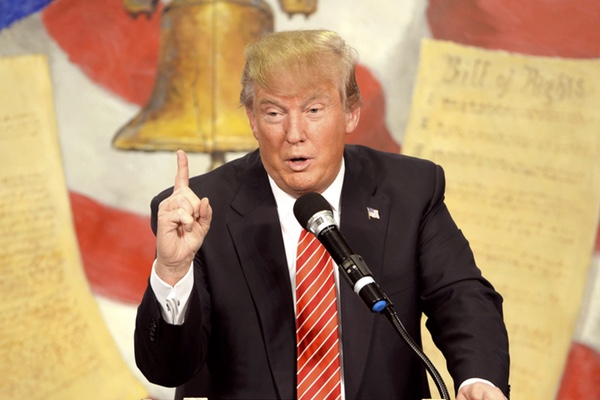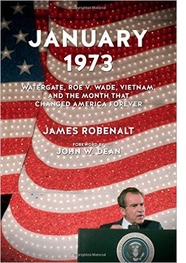Does Trump Place More Value in the 2nd Amendment than the 1st?

Last week, Donald Trump went ballistic over a headline from the Washington Post and declared that he would revoke the campaign credentials of the newspaper.
According to Trump: “We no longer feel compelled to work with a publication which has put its need for ‘clicks’ above journalistic integrity. They have no journalistic integrity and write falsely about Mr. Trump.” He claimed the paper’s owner, Amazon founder Jeff Bezos, was using the Post as a political tool.
 Here we go again. On January 1, 1973,
Richard Nixon called Chuck Colson to join him in the Oval Office.
Nixon was peeved over White House rumors that his National Security
Advisor, Henry Kissinger, had had breakfast with Max Frankel, a
writer for the New York Times. “How could he do that,
Chuck?” Nixon gasped. “After what they have done to us?”
Here we go again. On January 1, 1973,
Richard Nixon called Chuck Colson to join him in the Oval Office.
Nixon was peeved over White House rumors that his National Security
Advisor, Henry Kissinger, had had breakfast with Max Frankel, a
writer for the New York Times. “How could he do that,
Chuck?” Nixon gasped. “After what they have done to us?”
Nixon then turned to the press in general, asking for a list of friends and enemies, demanding rewards and punishments. On this morning, he focused his ire particularly on David S. Broder of the Washington Post, considered the “Dean” of the Washington, D.C., press corps and a regular on NBC’s Meet the Press. Broder in fact would win the Pulitzer in 1973 for his commentary.
Nixon was unhappy with reporting on his efforts to end the Vietnam War. In December 1972, he secretly ordered a massive bombing campaign to force a peace settlement, as negotiations in Paris with the North Vietnamese had stalled. This campaign, though, would be composed of nighttime raids using over 100 B-52 Stratofortress war planes to hit targets in Hanoi and Haiphong, both heavily populated cities in North Vietnam. The international reaction had been sharp and negative. Many asked if Nixon had gone mad.
In making his decision to bomb, Nixon consulted no one other than Alexander Haig and Henry Kissinger. In fact, he ordered the raids, infamously known as the “Christmas Bombings,” while Congress was away. He hoped to accomplish his goal before the new Congress, including a newly elected Democratic senator named Joe Biden, returned. Nixon feared that the House and the Senate, both Democratically controlled despite Nixon’s 1972 landslide, would vote to end further funding for the war in Vietnam.
So on January 1, 1973, he ordered the Washington Post to be “cut-off, totally.” No one in the Administration was to talk to the Post, and the Post would not be invited to any White House events. The entire conversation with Colson is on tape. One can listen to it by visiting the Nixon Library website, pulling down the White House Tapes tab from its virtual library, and finding Tape 829-12a. The rant starts about five minutes into the tape.
Nixon made a list of those newspapers he considered to be hostile—and he sought revenge.
Trump similarly is making his list—he has already barred Politico, the Des Moines Register, the Daily Beast, Buzzfeed, National Review and the Huffington Post.
The attacks on the free press are signals. Like Nixon, Trump appears to abhor a free and vibrant press. It is a characteristic of a leader who is thin-skinned and insecure. It is also a warning shot—Nixon’s antagonism to the press was part and parcel of the way he exercised power. He saw the press and the establishment as the enemies and he believed he was subject to a double standard—justifying his own abuses of power. The Watergate cover-up arose mainly because Nixon rationalized that others had done worse and gotten away with it—take Daniel Ellsberg and his release of the Pentagon Papers, for example. What was a simple burglary by comparison to leaks that threatened national security?
The question is does Donald Trump place any value in the freedoms embodied in the 1st Amendment of the United States Constitution? “Congress shall make no law respecting an establishment of religion, or prohibiting the free exercise thereof; or abridging the freedom of speech, or of the press; or the right of the people peaceably to assemble, and to petition the government for a redress of grievances.”
Seems like every one of these freedoms—of speech, of the press, of religion, of peaceful assembly—is imperiled by a future Trump presidency.
Perhaps his unwavering support of the 2nd Amendment is also misplaced. Wasn’t the (now archaic) rationale for allowing the people to bear arms exactly to protect the freedoms like those found in the 1st Amendment? The founders weren’t all about protecting the right to hunt—they wanted the people to be able to protect the Republic they were creating from the exercise of tyrannical power. How can that be squared with Trump’s assault on the press? Or his calls for immigration bans based on religion? Or his encouragement of violence at his rallies?
If past is prologue, Trump’s aggression against the press should serve as a powerful caution to his candidacy. Nixon’s tapes provide a roadmap to what can go wrong.